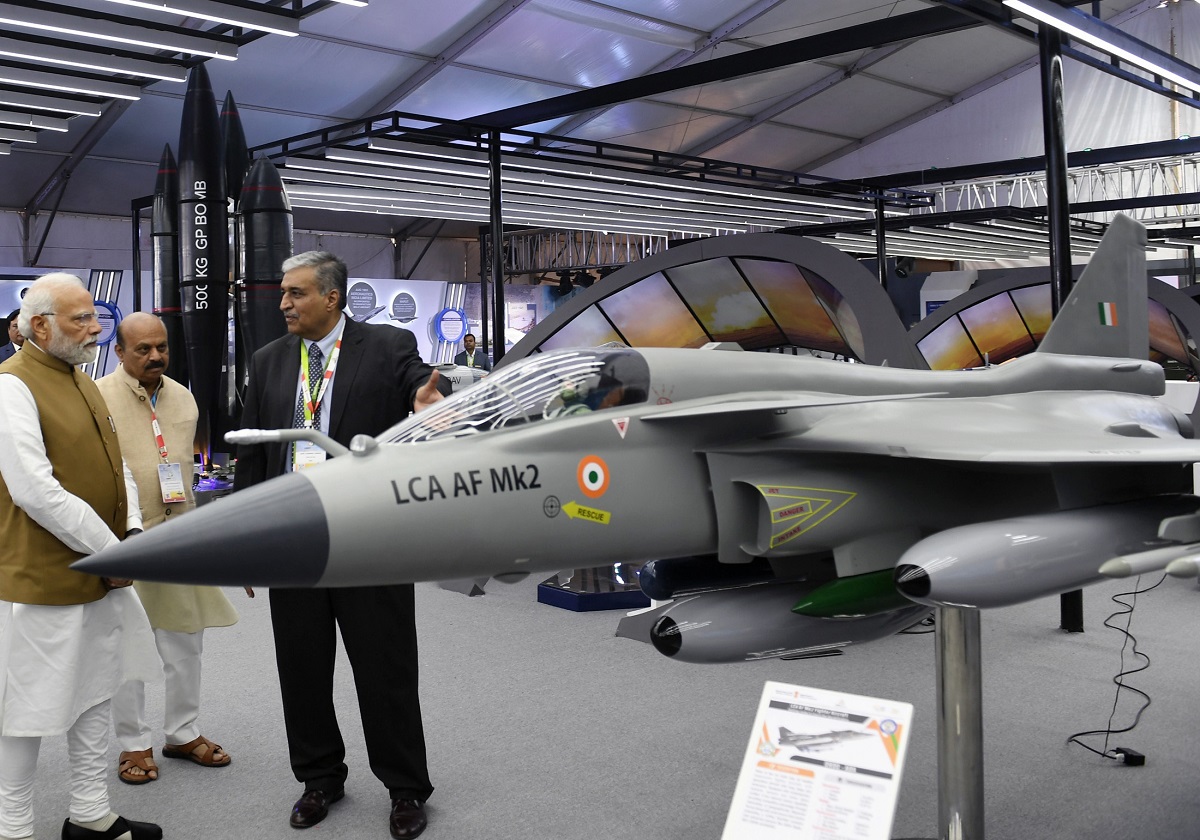SOURCE: RAUNAK KUNDE / NEWS BEAT / IDRW.ORG

India’s indigenously developed Tejas Mk2, a 17.5-ton all-up weight (AUW) fighter aircraft, is on the horizon, and it promises to be a game-changer in terms of indigenization and capabilities. With its planned rollout next year, the Tejas Mk2 is set to become a symbol of India’s self-reliance in the field of defence aviation.
Key Indigenization Milestones:
- Made in India F-414 Engine: One of the significant milestones contributing to the Tejas Mk2’s high indigenization is the development of the Made in India F-414 engine for the aircraft. This engine is crucial for the fighter’s performance and self-reliance goals.
- Pre-production Tejas Mk2 Aircraft: The Tejas Mk2 program is set to achieve 70% indigenization in its pre-production phase. This level of indigenization surpasses that of the Tejas Mk1A fighter jets, which have 62% indigenization. It underscores the steady progress India is making in enhancing its domestic defence capabilities.
- Production Variant: The production variant of the Tejas Mk2 aims for an even higher level of indigenization, targeting an impressive 80%. This is a testament to India’s commitment to reducing dependency on foreign suppliers for its defence requirements.
India’s Hindustan Aeronautics Limited (HAL) is collaborating with General Electric (GE) to achieve a significant milestone in the Tejas Mk2 program. The focus of this collaboration is to secure the Transfer of Technology (ToT) for the F-414 engine. This critical endeavour is expected to conclude within the next six months.
The first engine manufactured in India under this ToT agreement is anticipated to be rolled out three years from the contract’s date. GE has already delivered eight F-414 engines to HAL for use in the developmental phase of the Tejas Mk2 program, setting the stage for further progress.
Key Features of the Tejas Mk2:
- Close-Coupled Canards: The Tejas Mk2 will feature close-coupled canards, which are small wing-like structures positioned near the cockpit. These canards enhance the aircraft’s manoeuvrability and stability, particularly at high angles of attack.
- Indian-Made AESA Radar and IRST System: The fighter will be equipped with an Indian-made Active Electronically Scanned Array (AESA) radar and an Infrared Search and Track (IRST) system. These advanced sensors significantly improve situational awareness and targeting capabilities.
- Full Touch Wide Area Display: The Tejas Mk2 will introduce a Full Touch Wide Area Display, offering a modern and intuitive cockpit interface for the pilot. This technology enhances mission management and reduces pilot workload.
- Side Stick Mount: The Tejas Mk2 is set to feature the first side stick mount, a control interface for the pilot. This design innovation enhances pilot control and reduces the aircraft’s overall weight.
The induction of the Tejas Mk2 into the Indian Air Force (IAF) is planned from 2029 onwards. This advanced fighter is expected to replace existing fighter types in the IAF fleet, including the Mirage-2000, Jaguars, and Mig-29. The Tejas Mk2’s high level of indigenization ensures greater self-reliance and control over its production and maintenance, strengthening India’s defence capabilities.
NOTE : Article cannot be reproduced without written permission of idrw.org in any form even for YouTube Videos to avoid Copy right strikes. Websites doing illegal reproductions will get DCMA and Legal Notices.